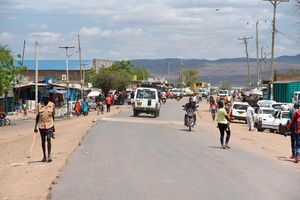
Stagnant dirty water and garbage on a road within Pipeline estate in Nairobi.
Earlier this month, the Ministry of Health confirmed a cholera outbreak in Migori, Kisumu and Nairobi counties. Within that announcement was a figure we cannot ignore: 97 confirmed cases and six deaths by April 6, a case fatality rate of 6.2 per cent. And while cholera is not new to us, its resurgence should prompt serious reflection.
When people die from cholera, they are not just dying because of the bacteria that causes the disease—they die because of a failed health system. Cholera in Kenya does not appear because we lack knowledge—the outbreaks are a symptom of how we have chosen to not prioritise measures that would eradicate it.
This outbreak comes at a time when the Cabinet Secretary for Health, Aden Duale, is stepping into office with ambitious reform promises and a stated commitment to restructuring the Ministry of Health. However, many Kenyans are asking a basic but urgent question: Do our leaders truly understand the importance of public health prevention and promotion?
Duale, like his predecessors, is regurgitating the same tired promises. The government has repeatedly stumbled in the rollout of social health insurance and other flagship programmes in Kenya’s journey toward universal health coverage. Instead of addressing the glaring gaps—from underfunded primary healthcare to the chronic neglect of community health workers—we are now fixated on digitising the health system, as though technology alone can cure deeply rooted dysfunction. Yet even this digitisation agenda is already showing signs of collapse.
A recent audit has exposed serious failures within the Social Health Authority’s (SHA) Sh104.8 billion healthcare digitisation project. According to Auditor-General Nancy Gathungu, the initiative is plagued with procurement irregularities, opaque contracting and blatant violations of public finance laws. Far from enhancing efficiency, the system has become a black hole for taxpayer money. We have become a country obsessed with grand healthcare plans—glamorous on paper, complete with ribbon-cutting ceremonies —while the basics continue to be neglected.
Public health
The cholera outbreak is not just a public health crisis; it is a glaring symptom of our failure to invest in clean water infrastructure, public sanitation, waste management and strengthening of community health systems. In the process, we are failing to uphold the most basic right of all: the right to life.

Health officials are on high alert following a cholera outbreak.
We cannot purport to address public health when we have glaring inequalities in the social determinants of health. Cholera thrives in gaps created by inequality and neglect, and it often shows up where families rely on shared pit latrines and unsafe water sources. It appears in drought-stricken counties where rivers have dried up and communities are forced to use stagnant ponds. It flares up in places where floods have overwhelmed weak infrastructure, mixing sewage with drinking water. And in every case, it reveals how unequal our country really is.
It is not surprising that cholera often returns among communities with indigent populations—communities that often queue at a single communal tap, if they’re lucky to have one. Studies have shown a dual correlation between communities that experience hunger and food insecurity and engagement in risky behaviours. These communities often prepare meals without proper sanitary conditions, drink unsafe water and skip handwashing to conserve the little water they have. These communities are often faced with impossible choices—such as whether to buy food, soap, or clean water. These are not the choices Kenyans should be forced to make in the 21st century, especially not when we have billions of shillings allocated to digital infrastructure.
Oral vaccines
This inequality is also gendered. Women and girls, often bearing the primary responsibility of collecting water, cooking, cleaning and caregiving—while also serving as first responders in households—often lack essential resources and support, and their voices are excluded from public health decision-making tables.
This is the part that stings the most: cholera is entirely preventable. With advancements in science, we know that oral vaccines can reduce transmission by up to 65 per cent—so why are we not investing in widespread vaccination campaigns? We also know that community health workers are a vital part of the health workforce. They play a critical role in delivering early warnings, raising community awareness, conducting disease surveillance and supporting rapid response efforts. Yet, we continue to ping-pong community health workers between recognition and neglect.
The recent conversation about the government privatising water raises further concern. Such a move would widen the inequality gap, increasing the risk of transmission of waterborne diseases like cholera by limiting access to clean water, particularly for indigent communities. We must fiercely guard public goods like water to ensure equity and protect public health.
While we cannot and should not defund curative care, we must rethink how we finance health promotion and prevention—they should be seen as key strategies to reduce the overall burden of disease and the skyrocketing costs of curative and rehabilitative care. Cholera, like many other preventable waterborne diseases, should not elicit a knee-jerk response only during outbreaks, it should be treated for what it truly is: a predictable outcome of years of structural neglect.
So what needs to change? We must shift our focus and centre prevention in our national health agenda. Access to clean water is a fundamental health priority. We must ring-fence health budgets from mismanagement, misalignment and corruption, ensuring that resources actually reach those most in need and at highest risk. It is time to stop neglecting community health workers—they are the backbone of our health promotion and disease prevention system.

Kenya has so far recorded 100 cases cholera in the latest outbreak.
They need fair pay, comprehensive training and sustained investment. With the climate crises Kenya is facing—increasing frequency of both floods and droughts—we must build climate-resilient water and sanitation systems. Public health planning must now integrate climate-responsive strategies that protect communities from environmental shocks before they escalate into health disasters.
We must choose to be the country that refuses to normalize preventable deaths. A country that finally listens to the cries of communities who have endured preventable health crises for far too long. Because if we cannot guarantee clean water and safe sanitation in 2025, then we must ask ourselves: what does universal health coverage truly mean?
The writer is a medical doctor. stebosi51@gmail.com.






